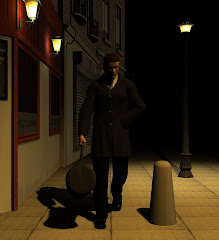After the disappearing tax discs (see my previous post) identity theft is in the news again. It is one of those things, like avian flu or bio-terrorism, that never entirely goes away despite its lack of substance. Whenever nothing much is happening and we're starting to look too contented, journalists always get one out of the drawer and whack us over the head with it. The term is a dramatic one but doesn't really mean the theft of a whole identity. Sometimes passport forgery is involved. Mostly, though, it just means somebody getting access to your bank account. But maybe that's all our identity is supposed to be reduced to: our savings. In the same way that 'lifestyle programs' tell us not how to style our life but how to spend our money.
The Guardian, which is supposed to know better, has been getting in on the fun. An investigation yesterday found that not only are account details being stolen, they are offered up for barter on the internet. One can apparently sidle into certain websites and thence into chat rooms. There one meets dodgy characters operating from "frozen Siberia" who offer a whole range of sort codes for a fistful of Paypal credits. Why do all the cybercriminals seems to be from Russia, incidentally? Admittedly it's a rather impoverished and lawless country, but surely some American or British criminals are muscling into the action? I suspect that some are, but use fake Russian names to give them extra credibility. Just as no spam scam is taken seriously unless it's Nigerian.
Anyway, the comedy of the story comes from the apologetic last paragraph. The Guardian's journalist bought the details of one account. A week later, he was still waiting to receive said details. This probably happens a lot: one hundred per cent of the time seems a good guess. After all, if you're a criminal with genuine account details before you, would you just sell them on to receive a fraction of their value? Or if you did sell them, wouldn't you first empty them right up to their overdraft limit? And then have a good laugh at the buyer? A lot of chat rooms resemble bad nightclubs. The ones which The Guardian is shrieking about is a seedy East End pub holding a ferret-faced man with deep pockets. He claims the gold necklaces he's offering you are genuine. He hints they are stolen. But what he's really got is the meeting of fairground trinkets and a lot of yellow paint.
Crooks con other crooks. I'm glad that it still goes on. It's an ancient practice, understandably so. One danger, that of being reported to the police, is removed. The other used to be that of the conned tracking the conner down and beating him to a bloody pulp with baseball bats. But now the miracle of the internet protects the grifters from that as well. After all, they are all hidden in frozen Siberia.
Sunday, November 25, 2007
Subscribe to:
Post Comments (Atom)

No comments:
Post a Comment